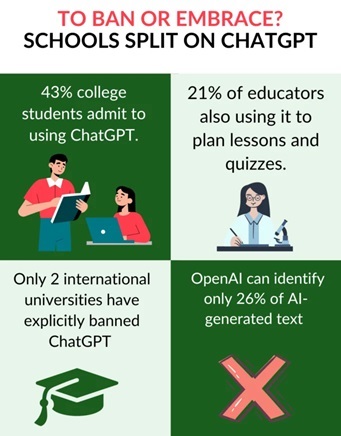Dear Commons Community,
The Chronicle of Higher Education has two articles this morning on AI. One, written by Matthew Kirschenbaum, distinguished university professor of English at the University of Maryland at College Park, is entitled, AI May Ruin the University as We Know It: The existential threat of the newest wave of ed-tech. The second, written by Marc Watkins, assistant director of academic innovation at the University of Mississippi, is entitled, Make AI Part of the Assignment: Learning requires friction. Here’s how to get students to disclose and evaluate their own usage of tools like ChatGPT. The two articles could not be more different in their approach to the use of AI in the academy. Here are two excerpts.
Matthew Kirschenbaum:
“The vision of the future of education is either dystopian or utopian, depending on one’s sympathies for the idea that the classroom must necessarily once again be disrupted to better serve students, and depending too on the stake one has in the industries that are going to profit from the enterprise. In addition to the obvious red flags — shouldn’t the plan encouraging students to record their professors and classmates be run by the legal department? — such breezy promotions of the next big thing in the AI-powered ed-tech domain point to a significant shift in the higher-education landscape, one that is different in both degree and kind from the previous hype cycles that brought us iClickers, MOOCs, courseware, and Second Life. All of these tools were discrete, online, on separate platforms. But today, AI feature sets are integrated in all of the core educational enterprise systems — Google, Canvas, Zoom, and Office to name a few — and the tools are not only ready to hand, but always on, perhaps even requiring admin privileges to disable. Not surprising, then, is the deluge of higher-education summits, white papers, ad hoc committees and task forces, along with the many new research centers, curricular initiatives, and cluster hires — all suggesting that institutions are rushing to demonstrate that they too are embracing the new way to “do school…
“..In essence, the university itself has become a service. The idea of the University as a Service extends the model of Software as a Service to education. Software as a Service refers to the practice of businesses licensing software and paying to renew the license rather than owning and maintaining the software for themselves. For the University as a Service, traditional academic institutions provide the lecturers, content, and degrees (for now). In return, the technological infrastructure, instructional delivery, and support services are all outsourced to third-party vendors and digital platforms.
Marc Watkins:
“Giving students the opportunity to think critically and openly about their AI usage lays bare some uncomfortable truths for both students and teachers. It can lead both parties to question their assumptions and be surprised by what they find. Faculty members may discover that students actually learned something using AI; conversely, students might realize that their use of these tools meant they didn’t learn much of anything at all. At the very least, asking students to disclose how they used AI on an assignment means you, as their instructor, will spend less time staring into tea leaves trying to discern if they did.
But, you may be wondering, won’t some students just use ChatGPT to write this assessment, too? Sure. But in my experience, most undergraduates are eager for mechanisms to show how they used AI tools. They want to incorporate AI into their assignments yet make it clear they still used their own thoughts. As faculty members, our best bet is to teach ethical usage and set baseline expectations without adopting intrusive and often unreliable surveillance.”
The debate on the use of AI and other related technologies will dominate our discussions in higher education for years to come. And keep in mind that we are only at the beginning of AI development.
Tony



